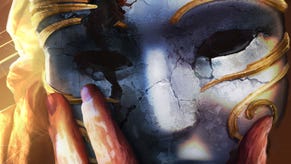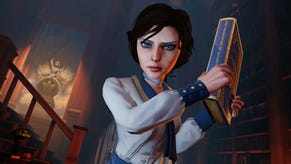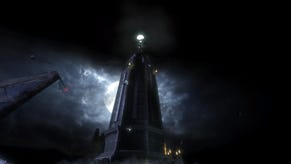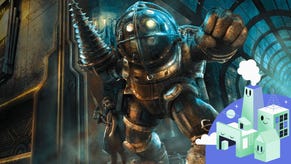Building BioShock
Ken Levine, Bill Gardner and Chris Kline on narrative, creativity, controversy.
Gamers have a strange, and in ways very English, attitude to success - a cautious, suspicious response that says that it's okay to be successful, as long as you pretend you're not and keep your mouth shut. Talk about how you made your game, what you learned from it or why you think it did well, and the internet will rise up swiftly to accuse you of having a God complex and believing that the sun shines out of your own backside like a perverse, fleshy torch.
It's something that people like Ken Levine, the creative lead on last year's wildly successful BioShock, fall foul of on a regular basis. Levine isn't a man given to silence - when he speaks, he speaks volumes, and his analytical, even philosophical approach means that he's happy to dissect his own successes (and failures) at great length. For those who loved BioShock and are intrigued to know more about the creative process which spawned it, that's great news. For everyone else, it probably means eye-rolling and accusations of megalomania ahoy.
Levine and his team - including design lead Bill Gardner and technical director Chris Kline, both of whom joined us for this interview - are hard at work on their next project, and probably not that bothered by the slings and arrows of those who accuse them of self-aggrandising. They're certainly more than happy to talk about BioShock, discussing the creative process, the slow evolution of the game, and even the occasional controversy and criticism which followed the launch. So, with the benefit of 20/20 hindsight on one of last year's biggest games, we started off by talking about one of BioShock's strongest suits - the story.
The goals were there, but the particulars? Almost none.
That I wanted it to be player-driven, that I wanted it to be non-cutscene oriented.
The themes as well, I think. The extremism and all of that.
Sort of, sort of... Really? I think the AI ecology was the genesis of that.
We wanted to see what we could do that would differentiate us from other people, given our experience.
It all kind of came together - like, we wanted a world that's cut off from the rest of the world. So, have an underwater city. Well, why on earth would there be an underwater city? Maybe it's a utopia. What kind of utopia would it be? We had these gatherers, these Little Sisters, so maybe it was some kind of economic thing, or a philosophical thing. I personally had been reading all that stuff, like every kid who went to some liberal arts college, so I sort of tuned into that. It accretes over time. Ideas build on other ideas.
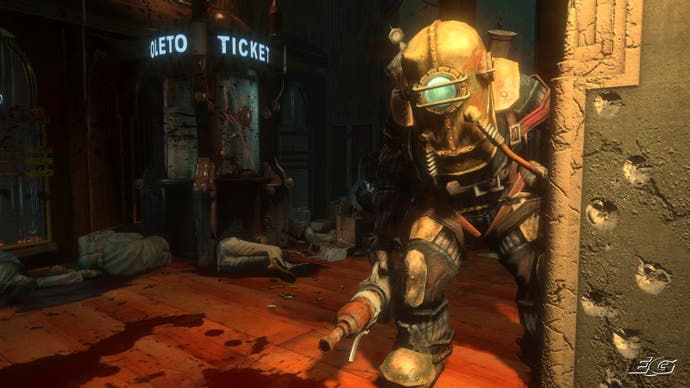
Yeah, I think that's... To me, the narrative core is that Rapture is a place where people have removed their limitation - of all kinds, completely. Either artificially, or philosophically. What happens? What happens in that situation - when there are no constraints of any kind? We built it from there - things like the genetics stuff came out of that, and the characters all grew out of that. We kept building on that theme.
We had the medical level, right? At first, that was just some doctor guy. We had a mission where you had to go and kill this doctor, and he had a key - a very basic thing. Then I said, this doctor needs to be somebody - so, who is he? I thought of Ryan, and I asked, what would Ryan be if he was a doctor? He'd be this guy who says no limits - I want no limits on me.
That became Steinmann. We asked, what would that guy's personality be like? He'd think he's like Picasso - that he could reinvent the form, even in a form that really can't be reinvented, like plastic surgery. He'd think that anybody trying to limit him was an enemy of his.
They're all reflections of Ryan, all of those characters - Steinmann and Cohen, they're reflections of Ryan. They're people who say - no limits, no limits, no limits.
It's funny, because you have half the people saying that - and you have half the people saying, it's objectivism boosterism.
It's an amazing accomplishment, right? The city itself is a pretty amazing accomplishment...
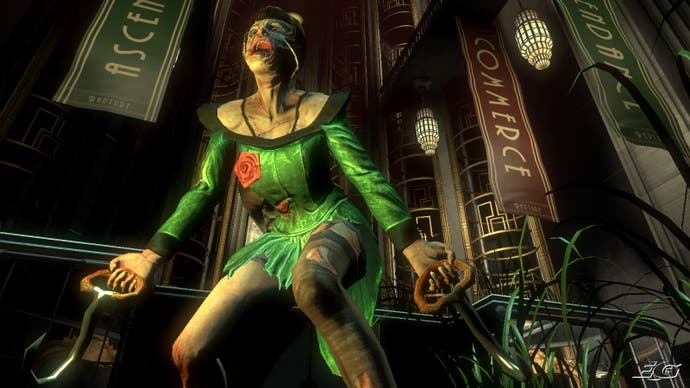
Well, we kill each other here, too. Is a great nation not a great accomplishment because it goes to a horrible war? England's been to a lot of wars, does that mean it's not an amazing nation?
It's more of a treatise on extremism than on objectivism.
System Shock 2 had a lot of similar themes, where you had Shodan and you had the Many. That was something we introduced - I always feel like a person caught between idealogues. I think that politically, I feel that way, and in general, I think that the most successful people - the people I like to work with most - are people who don't have rules about their lives. They don't have rules about how they do things. They follow logic, not ideology.
I'm very uncomfortable with strong ideologies that people follow regardless of the facts at hand. To me, that's always where things end up in the sh***er - saying, we're going to follow this ideology, and the ideology must always be right.
So, in System Shock 2 we had Shodan, who was the ultra-id, and I came up with a counterpart for Shodan, which was the Many - this glorious union of everybody. They were both merciless in their views as to their ideology.
You can only be so scary, you know. What ideologies are about is putting a whole world-view in place. You don't have to show Shodan building this giant city - you know what this city will be like, because she's Shodan. You know what the Many would do with the world, how they would suck the individuality out of everything - while Shodan would crush everyone with her will.
In BioShock, it's the same thing. You have Ryan, who has this ideology of embracing the will of man and nothing else, with no limits - and you have Fontaine, who is the opposite. He's almost got no ideology, he doesn't believe in anything - he's a nihilist. You're stuck between those two people, and that gives the player space to think about those extremes.




